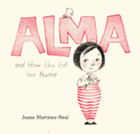
For Alma Sofia Esperanza José Pura Candela, her oversized moniker is "'so long... [i]t never fits.'" Her father knows something more: "Let me tell you the story of your name," he offers, "Then you decide if it fits."
Opening the family photo album, Daddy explains how Alma got each of her names: Sofia for her "books, poetry, jasmine flowers"-loving grandmother; Esperanza for her great-grandmother who hoped to travel the world; José for her artist grandfather; Pura for her great-aunt who "believed that the spirits of our ancestors are always with us"; and Candela for her activist "other" grandmother. With each ancestral tale, Alma enthusiastically underscores her direct connections to her familial inheritance. When Daddy finally arrives at how he chose "Alma," she realizes her name "fits [her] just right," with all the room she needs to write her own story.
Juana Martinez-Neal, who won a 2018 Pura Belpré Illustrator Award for La Princesa and the Pea by Susan Middleton Elya, makes her author/artist debut with a story of her own--literally. Alma and How She Got Her Name also doubles as a glimpse into Martinez-Neal's multi-monikered background: her full name, Juana Carlota Martinez Pizarro, holds her own family history, which she shares in her author's note. As artist, her mostly black-and-white graphite and colored pencil drawings with splashes of red (suggesting now) and blue (capturing then) provide an additional, enhancing narrative: the family's Peruvian roots, Alma's avian and floral interests, her bilingual drawings, her historically inspired style sense, even a peek at Esperanza's worldly treasures.
Names are so much more than a collection of letters and sounds, Martinez-Neal reminds. The book's final words, "What story would you like to tell?" become an invitation for readers to share and claim each of their own, distinctive stories, histories and identities. --Terry Hong, Smithsonian BookDragon

